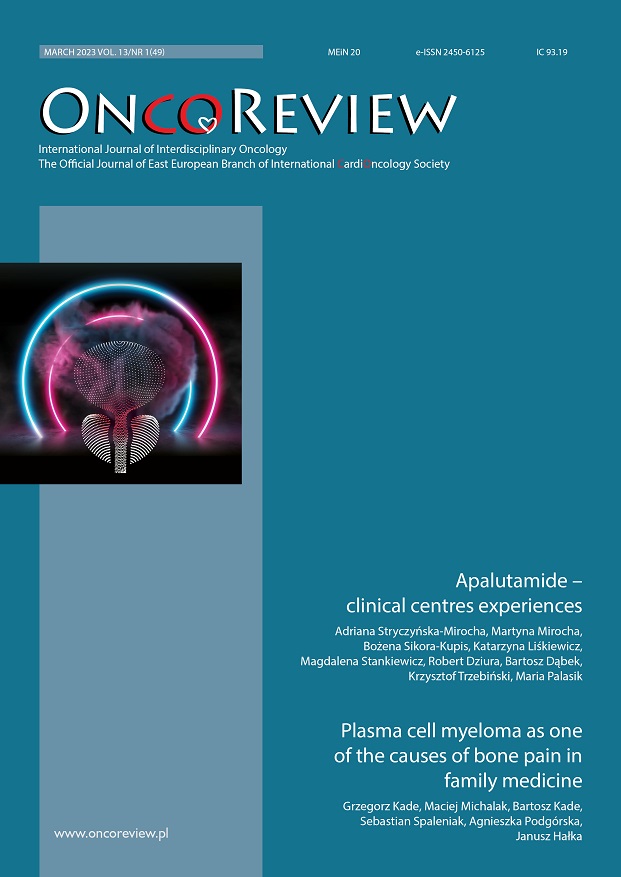Apalutamid w leczeniu nieprzerzutowego opornego na kastrację raka gruczołu krokowego u pacjenta w podeszłym wieku z licznymi obciążeniami internistycznymi Opis przypadku
##plugins.themes.bootstrap3.article.main##
Abstrakt
Rak gruczołu krokowego od 2016 r. jest najczęstszym nowotworem złośliwym u mężczyzn w Polsce i stanowi drugą co do częstości przyczynę zgonu w tej grupie chorych. Podstawową metodą leczenia pacjentów z zaawansowanym rakiem prostaty jest terapia deprywacji androgenów, jednak z upływem czasu dochodzi do ewolucji guza i jego przemiany w postać oporną na kastrację, która stanowi rzeczywiste zagrożenie dla życia. W niniejszej pracy przedstawiono przypadek pacjenta w podeszłym wieku z obciążeniami internistycznymi, u którego w stadium oporności na kastrację zastosowano w I linii leczenia systemowego bloker receptora androgenowego nowej generacji – apalutamid.
Pobrania
##plugins.generic.paperbuzz.metrics##
##plugins.themes.bootstrap3.article.details##
Copyright: © Medical Education sp. z o.o. This is an Open Access article distributed under the terms of the Attribution-NonCommercial 4.0 International (CC BY-NC 4.0). License (https://creativecommons.org/licenses/by-nc/4.0/), allowing third parties to copy and redistribute the material in any medium or format and to remix, transform, and build upon the material, provided the original work is properly cited and states its license.
Address reprint requests to: Medical Education, Marcin Kuźma (marcin.kuzma@mededu.pl)
Bibliografia
2. Mohler JL, Antonarakis ES, Armstrong AJ et al. Prostate cancer, Version 2.2019, NCCN clinical practice guidelines in oncology. J Natl Compr Cancer Netw. 2019; 17(5): 479-505.
3. Dai C, Heemers H, Sharifi N. Androgen signaling in prostate cancer. Cold Spring Harb Perspect Med. 2017; 7(9): a030452.
4. Howard LE, Moreira DM, De Hoedt A et al. Thresholds for PSA doubling time in men with non-metastatic castration-resistant prostate cancer. BJU Int. 2017; 120(5B): E80-6.
5. Smith MR, Kabbinavar F, Saad F et al. Natural history of rising serum prostate-specific antigen in men with castrate nonmetastatic prostate cancer. J Clin Oncol. 2005; 23: 2918-25.
6. Whitney CA, Howard LE, Freedland SJ et al. Impact of age, comorbidity, and PSA doubling time on long-term competing risks for mortality among men with non-metastatic castration-resistant prostate cancer. Prostate Cancer Prostatic Dis. 2019; 22: 252-60.
7. Saad F, Cella D, Basch E et al. Effect of apalutamide on health-related quality of life in patients with non-metastatic castration-resistant prostate cancer: an analysis of the SPARTAN randomised, placebo-controlled, phase 3 trial Lancet Oncol. 2018; 19: 1404-16.
8. ERLEADA (apalutamide) [prescribing information]. Janssen Pharmaceutical Companies, Horsham, PA (2019).
9. Chi KN, Agarwal N, Bjartell A et al. Apalutamide for metastatic, castration-sensitive prostate cancer. N Engl J Med. 2019; 381: 13-24.
10. Desai K, McManus JM, Sharifi N. Hormonal Therapy for Prostate Cancer. Endocr Rev. 2021; 42(3): 354-73.
11. Smith MR, Saad F, Chowdhury S et al. Apalutamide and Overall Survival in Prostate Cancer. Eur Urol. 2021; 79(1): 150-8.
12. Roach M 3rd, Ceron Lizarraga TL, Lazar AA. Radical Prostatectomy Versus Radiation and Androgen Deprivation Therapy for Clinically Localized Prostate Cancer: How Good Is the Evidence? Int J Radiat Oncol Biol Phys. 2015; 93(5): 1064-70.
13. Bolla M, Van Tienhoven G, Warde P et al. External irradiation with or without long-term androgen suppression for prostate cancer with high metastatic risk: 10-year results of an EORTC randomised study. Lancet Oncol. 2010; 11(11): 1066-73.
14. Calais da Silva FE, Bono AV, Whelan P et al. Intermittent androgen deprivation for locally advanced and metastatic prostate cancer: results from a randomised phase 3 study of the South European Uroncological Group. Eur Urol. 2009; 55(6): 1269-77.

